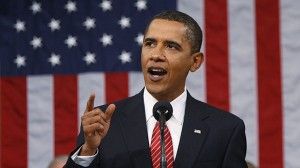Obama Speech to Call for Defense Cuts, Tax Reform
President Barack Obama enters politically tricky territory Wednesday when he outlines his plan for reducing long-term deficits and the national debt amid a climate of tense budget negotiations.
Obama's speech at George Washington University will follow White House talks in the morning with congressional leaders who are staking out positions on upcoming issues, including approval of last week's budget deal for the rest of the current fiscal year, increasing the federal debt ceiling and crafting a budget for fiscal year 2012.
For Obama, the speech is a response to a Republican budget plan for next fiscal year released last week by House Budget Committee Chairman Paul Ryan, R-Wisconsin, that would overhaul the Medicare and Medicaid government health care programs for the elderly while reforming the tax code to lower rates and eliminate loopholes.
The Ryan plan is strongly opposed by the White House and congressional Democrats, who said it protects the wealthy while putting the burden of spending cuts and other reforms on the middle class and poor.
A White House official said Obama's speech would emphasize "shared prosperity and shared responsibility," advocating a balanced approach to control expanding deficits while protecting vital spending for education, innovation and clean energy.
According to the official, Obama will call for holding down domestic spending, cutting defense spending, reducing costs while strengthening Medicare and Medicaid, and tax reform.
"The president's proposal will build off of the deficit reduction measures included in his 2012 budget and will borrow from the recommendations of the bipartisan Fiscal Commission he created" last year, the White House official said.
Obama's vision "is one where we can live within our means without putting burdens on the middle class and seniors or impeding our ability to invest in our future," the official said.
Senate Majority Leader Harry Reid, D-Nevada, said Tuesday that Obama should address inequities in the tax code that benefit moneyed interests.
He called for a halt to subsidies for oil companies and deductions for companies that transfer jobs overseas.
Reid also said additional revenue must be part of any long-range fiscal solution. He didn't give specifics, but Democrats generally favor increasing the tax rate for families earning more than $250,000 a year to the levels of the 1990s before tax cuts implemented by the Bush administration.


